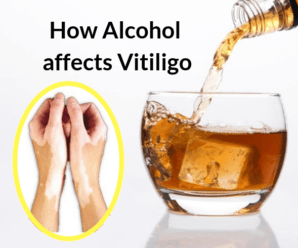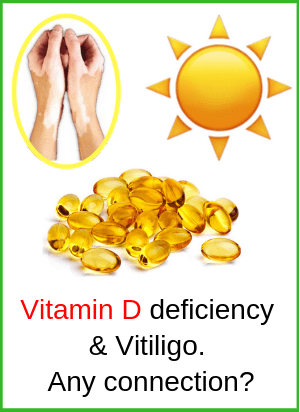
Vitiligo and Alcohol : All you need to know
Alcohol affects the liver, causes nutritional deficiencies, increases inflammation and disturbs your sleep to trigger vitiligo symptoms. It acts as a catalyst for the proliferation of bad bacteria in the gut to worsen leaky gut syndrome and trigger autoimmunity. People with autoimmune health challenges, including vitiligo, are often sensitive to alcohol. The regular alcohol consumption is a big NO for people with vitiligo. You may consume it once in a while though.
Vitiligo is an autoimmune skin challenge; the faulty and confused immune system overreacts and attacks the pigment producing skin cells to cause skin de-pigmentation in the form of white spots. The exact cause and cure of autoimmunity is yet to be identified. The list of leading causes is as below:
- Poor gut health- Poor gut health symptoms are chronic constipation, indigestion, heartburn, food allergies, low stomach acid, lack of healthy gut bacteria and others
- Chronic stress
- Hereditary (genetic issues)
- Impaired liver
- Acute nutritional deficiencies
- Over consumption of antibiotics and steroids
- Certain medications and vaccination
- Unhealthy diet, poor lifestyle and lack of sleep
- Respiratory infections such as strep throat
- Heavy metal toxicity due to contaminated water, pesticides and chemicals in foods
Poor gut health is the root of Autoimmunity
The majority of immune system cells live in the gut. (1) Hence, all autoimmune health issues, including vitiligo are linked to poor gut health. Improve your gut health and you will notice no further spreading of vitiligo lesions. In fact, the white patches will start turning smaller and the natural skin color will gradually be restored if you continue restoring the gut health.
Alcohol, Leaky gut and Vitiligo
The human gut is home to more than a 100 trillion microbes. Some of them are good, called as probiotics; some are bad, called as pathogens. Autoimmunity happens when the good bacteria are overpowered by the bad ones. It results in leaky gut.
To understand leaky gut, consider your gut as a whole long hollow pipe that starts at the mouth and terminates at the anus. Now, the lining (wall) of this pipe has a membrane like structure with micro holes. The lining separates all the content of your gut from the rest of your body and only allows nutrients to pass through and enter the bloodstream. In case of leaky gut, these extremely small holes get bigger due to damage to the lining. It results in leakage of bigger toxic stuffs (undigested food particles, bad bacteria, heavy metal toxins and other unwanted stuffs) seep through and mix with your blood and lymph to circulate through the body. Your confused immune system takes such a heavy load of toxins as threat to trigger an autoimmune reaction and hence, worsens the vitiligo symptoms.
How alcohol affects Leaky gut?
- Promotes growth of bad gut bacteria
Alcohol is one of the biggest contributors to leaky gut. (2, 3) Regular consumption of alcohol affects the gut flora to a large extent. It has a major impact on what kind and how many microbes live in the gut. It acts as a catalyst for proliferation of bad bacteria. (4) More the bad bugs, more intense will be the leaky gut symptoms.
Alcohol hinders proper digestion of the food you eat.
Poor digestion >> Higher amount of undigested food
The highly acidic nature of alcoholic beverages, along with high amount of undigested food is the perfect environment for bad bacteria. They feed on the undigested, rotten food and proliferate to further disturb the good-bad bacteria equilibrium and accelerate the progression of leaky gut symptoms.
- Increases gut inflammation
Alcohol restricts the production of key compounds, prostaglandins. The prostaglandins are anti-inflammatory in nature and help keep the gut inflammation in control. Lack of prostaglandins means higher gut inflammation. It will further fuel the leaky gut symptoms.
Undigested food (toxins) + Bad Bugs + Inflammation ⇒ Leaky gut
Thus, if you are a victim of frequent gut problem such as gas, bloating, constipation, indigestion and heartburn, better you completely stop alcohol consumption for 1 or 2 months and see if it helps. It may prove one of the best decisions of your life, from your health point of view.
Alcohol and Vitiligo – Going beyond Leaky gut
Apart from accelerating leaky gut symptoms, alcohol can worsen the vitiligo symptoms for so many other reasons:
- Body toxins– Even a single episode of heavy drinking (4 to 5 drinks or more) can increase the level of toxins in the blood. The impure blood is nothing, but, the propellant for autoimmunity. (5)
- Liver health– The liver is a vital body organ which is responsible for blood filtration and to breakdown the nutrients in smaller form for easy absorption by the body. The liver damage due to regular alcohol drinking is well-known. The alcoholic liver cirrhosis (liver damage due to alcohol) increases the risk of vitiligo and other autoimmune diseases. (6, 7) The immunosuppressant drugs, such as methotrexate, are prescribed to treat autoimmune conditions. These drugs can affect the liver functioning. Thus, it becomes even more important to stay away from alcohol if you are using such drugs because the two sided attack- from drug and alcohol- can be too much for the already impaired liver.
- Nutritional deficiencies– Vitiligo is often linked to nutritional deficiencies and alcohol can further aggravate it because regular alcohol consumption is associated with malabsorption of essential vitamins and other nutrients from the food we eat. (8)
- Obesity– The excessive alcohol drinking is associated with obesity. (9) The increased appetite due to alcohol results in overeating and increased body weight. (10) Obesity is a well known trigger for autoimmune diseases. (11)
- Depression– Vitiligo is quite a frustrating skin challenge and no one is immune to occasional depressing thoughts. But, alcohol is not a stress buster. It may give a temporary mood swing to make you feel better, but, in the long run, regular alcohol drinking increases the thoughts of depression and hopelessness. (12)
- Infections– Strep throat is a bacterial infection related to respiratory system and proves to be the culprit for onset of vitiligo symptoms for some people. Such people should stay away from alcohol because it increases the risk of respiratory problems.
Are you taking pharma drugs to treat vitiligo?
Alcohol can interfere with various pharma drugs to reduce their effectiveness. Thus, if you are into alcohol and taking medicines to treat vitiligo, better you discuss the same with your dermatologist so that the medicine dosage can be adjusted accordingly.
Tips to follow during occasional drinking
The infrequent alcohol consumption, once in a while, may not prove
that harmful. However, consider the below steps to further minimize the alcohol-induced damage:
- Choose the beverage with low levels of alcohol and sugar. Some brands add artificial colors and chemicals for appeal. Look for such harmful ingredients.
- Dilute your drink with a lot of water. It will automatically lower the alcohol concentration to reduce the burden on the liver and other organs.
- Try not to beyond 1 or 2 drinks at a time. You know, getting heavily drunk is not necessary to enjoy the company of your friends.
- After having drinks, hydrate your body with a lot of water before going to bed. It will help flush your kidneys to get rid of the residual alcohol quickly.
Is beer okay?

Due to low-alcohol content, beer has the reputation of a mild alcoholic beverage. But, it is a grain based drink; brewed from barley which contains gluten. The gluten is naturally occurring ‘sticky’ protein found in grains, hard to digest and problematic for the gut, when consumed in the excess. Thus, don’t overdo with it.
Takeaway
Show some love and care for your skin and overall health and stay away from regular alcohol drinking. Your body would be thankful to you if you quit alcohol once for all. If not, at least keep it once in a while; not more than 2 drinks a week. Having said that, the impact of alcohol on people with vitiligo may vary because of numerous factors that come into play, such as genetics, diet and lifestyle factors, stress level and how healthy you are as an individual.



